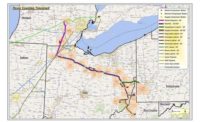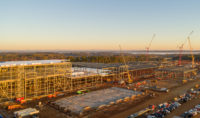Dominion Energy Transmission can continue work on certain portions of the Atlantic Coast Pipeline, despite a court order halting construction on the 600-mile project, according to an Aug. 14 decision by the Federal Energy Regulatory Commission.
On Aug. 6, the U.S. Court of Appeals in Richmond, Va., vacated two critical permits from the National Park Service and the U.S. Fish and Wildlife Service. The park service had not explained how building the pipeline under Blue Ridge Parkway in Virginia aligned with its mandate to conserve public land.
FERC on Aug. 10 ordered work to stop on the pipeline, but later, at Dominion’s request, said work could continue in some areas. The pipeline will move natural gas from West Virginia to Virginia and North Carolina.
FERC told Dominion there is no reason to believe the federal agencies would not issue new permits to satisfy court requirements. The utility says it is working to resolve issues without causing project delays. The agency said work not covered by the ruling could continue if Dominion could show it is independent. The utility said it would respond with “evidence demonstrating the independent public need to proceed.”
Environmentalists argue each independent project requires FERC review and a certificate of need. “Allowing construction on any of these segments would constitute an end run around the requirements of the Natural Gas Act,” says Greg Buppert, senior attorney for the Southern Environmental Law Center.
In a related action, FERC voted Aug. 10 not to reopen its 10-month-old decision to approve the project. Obama-appointed Commissioner Cheryl LaFleur dissented because she said the project was not in the public interest.





Post a comment to this article
Report Abusive Comment